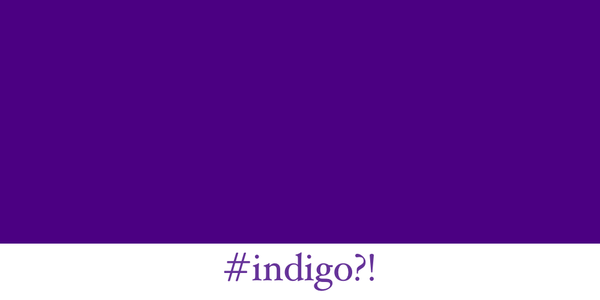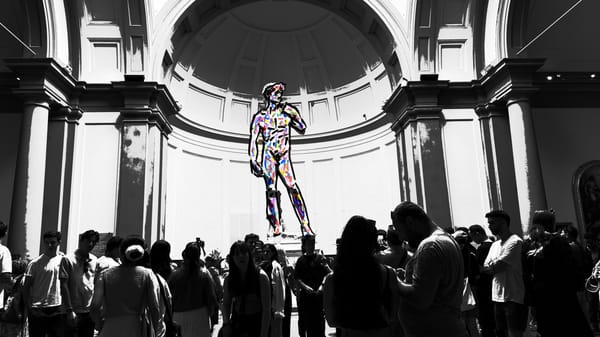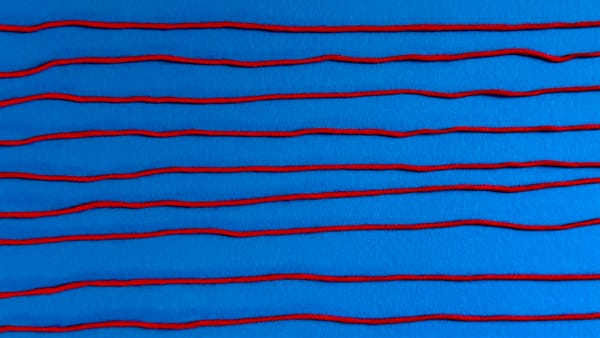Would you like a blue sky?
Some thoughts about the sky being blue.

I've been working on a piece this week which has proven to be more complex than I originally anticipated, but I didn't not want to go a week without sending a newsletter. There is no conclusion in this newsletter, nor is there necessarily a point I'm trying to make, it's some thoughts and questions I have when I look at the blue sky.
The sky today happens to be blue. But that is not always the case.
A 2012 CBS News article begins with the lede, “Here are three things most Americans take as an article of faith: The sky is blue. The pope is Catholic. And politicians are liars.”
If the first basic tenet of faith is not always true, we can either say, "it isn't really an article of faith." or "oh, we can change that."
Which blue?
We can compare the shades of blue between the sky over Paris, Los Angeles, Morocco, and Sydney, and realize that there is no one blue sky.
More than that, I've commented multiple times about the fact that Azure, Lapis, Ultramarine, Celeste, Cerulean, and Sky Blue all refer to different shades of blue, even though they are all originally based on the color of the sky.
It seems like one of the only blue color words to be based on the sky is "blue".
Technology Lies
It's difficult to rely on cameras to provide us with the objective shade of the sky. The picture above seems like a much deeper hue than the actual sky outside, even though it went through no editing.
Auto-color correcting technology in cameras and smartphones shift hues so imperceptibly it appears the same, but it is is trying to translate the natural realm of millions of hues to the artificial screen capability of hundreds of thousands.
Just as our eyes simplify colors, so does the camera, but to a greater extent. Our eyes do it in a subjective way, the digital camera has to fit into our existing accepted limitations for file size and accuracy. The more we accept a less accurate color, in order to receive a smaller file size.
And we have the ability to color correct to our hearts content, so we can post the perfect blue sky on social media.
In a counterintuitive way, every since we began using color photography, we have been limiting actively our limiting our perceptions of the spectrum of color in the natural world, yet, we believe we are creating a perfect simulacrum of reality.
Mastery of Weather
Make it Rain
For thousands of years, there have been stories of rainmakers in different cultures, who are able to summon rain in a time of drought. In the early 20th century, a sewing machine salesman named Charles Hatfield made a $10,000 deal with San Diego that it could make their 1/3 full Morena Reservoir overflowing within a year.
The ensuing rain in 1916 has been described as "biblical", with floodwaters washing away an entire community, and killing 50 people. (The city never ended up paying a dime, but he got business from other cities.)
While I don't know if Hatfield was legitimate, we know that now it is very possible to create make it rain. The jury is still out on if it is safe or now.
Let it Snow
In a more modern case in China, weather altering lead to a blizzard killing more than 40 people and causing more than half a billion dollars in damages.
Manipulating snow has also been done for the Olympics.
Weather Control
“[W]eather control was reserved for the ancient sky gods. Now the power has seemingly devolved to modern Titans.”
—James Fleming, 2007
According to international law, countries can now legally steal rain clouds from one another, by inducing rain while the clouds are still over their country.
But this isn't a weather newsletter, it's a color one.
Maintaining Our False Sense of Reality
What happens when pollution changes the color of reality, but our objective colors remain the same? Three examples off the top of my head are 1950s Pittsburgh with the coal mines and the steel mills, in which the sky was never blue. Or 1970s and 1980s Los Angeles with its smog. Or 2000s Guangzhou with its constant air pollution.
Our obsession to maintain the current color of reality can lead to problems. Both because the cost of maintaining our current perception of the world is quite high. Even presently, our attempts to mimic or maintain our nostalgic perceptions of the world, have proven to cause more harm than good.
Not every solution is bad. Increased smog regulations and the closing of the coal and steel plants show that nothing is irreversible. But those take long term planning, and buy in from many people.
The flip side of having control to make it rain is that we similarly have control over the weather to create blue skies, like China has done before the 2008 olympics, among other times. By rockets shooting silver iodide into clouds, we can induce rain and clear pollution. It may not be safe, though.
Astroturf was invented to mimic grass so perfectly that in many stadia they forego the real thing for the imitation. Our obsession with preternaturally green grass could be seen in Southern California during the extended drought, where people would still insist on wasting millions of gallons of precious water on maintaining perfectly green lawns.
I'm not sure if astroturf is a good thing or a bad thing, or if it needs to be one of the other. I just find it interesting the lengths we go to mimic reality, instead of creating our own.
Should we be open about fake things being fake?
Augmented Reality
While the science fiction virtual reality of the Matrix trilogy theorizes how the futuristic simulations of the planet will defer to these nostalgic color choices, like with much nostalgia, we conflate our depiction of history with what history was.
The same way we may nostalgically recall Norman Rockwell or Grant Wood’s America, an America which never was. Even in its time, it was stylized and idealized. Van Gogh's skies were never that color, but then again, that wasn't the point of his painting.
And every well-intentioned attempt we make to mimic the natural world, is another step towards the planet of the future being one defined by limits and control. We can conjure blue skies or clouds, if we’d like, with all the side-effects being damned.



